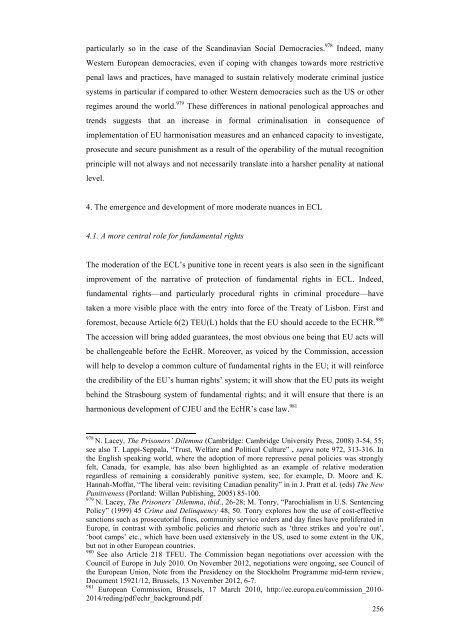The evolution of European Union criminal law (1957-2012)
The evolution of European Union criminal law (1957-2012)
The evolution of European Union criminal law (1957-2012)
You also want an ePaper? Increase the reach of your titles
YUMPU automatically turns print PDFs into web optimized ePapers that Google loves.
particularly so in the case <strong>of</strong> the Scandinavian Social Democracies. 978 Indeed, many<br />
Western <strong>European</strong> democracies, even if coping with changes towards more restrictive<br />
penal <strong>law</strong>s and practices, have managed to sustain relatively moderate <strong>criminal</strong> justice<br />
systems in particular if compared to other Western democracies such as the US or other<br />
regimes around the world. 979 <strong>The</strong>se differences in national penological approaches and<br />
trends suggests that an increase in formal <strong>criminal</strong>isation in consequence <strong>of</strong><br />
implementation <strong>of</strong> EU harmonisation measures and an enhanced capacity to investigate,<br />
prosecute and secure punishment as a result <strong>of</strong> the operability <strong>of</strong> the mutual recognition<br />
principle will not always and not necessarily translate into a harsher penality at national<br />
level.<br />
4. <strong>The</strong> emergence and development <strong>of</strong> more moderate nuances in ECL<br />
4.1. A more central role for fundamental rights<br />
<strong>The</strong> moderation <strong>of</strong> the ECL’s punitive tone in recent years is also seen in the significant<br />
improvement <strong>of</strong> the narrative <strong>of</strong> protection <strong>of</strong> fundamental rights in ECL. Indeed,<br />
fundamental rights—and particularly procedural rights in <strong>criminal</strong> procedure—have<br />
taken a more visible place with the entry into force <strong>of</strong> the Treaty <strong>of</strong> Lisbon. First and<br />
foremost, because Article 6(2) TEU(L) holds that the EU should accede to the ECHR. 980<br />
<strong>The</strong> accession will bring added guarantees, the most obvious one being that EU acts will<br />
be challengeable before the EcHR. Moreover, as voiced by the Commission, accession<br />
will help to develop a common culture <strong>of</strong> fundamental rights in the EU; it will reinforce<br />
the credibility <strong>of</strong> the EU’s human rights’ system; it will show that the EU puts its weight<br />
behind the Strasbourg system <strong>of</strong> fundamental rights; and it will ensure that there is an<br />
harmonious development <strong>of</strong> CJEU and the EcHR’s case <strong>law</strong>. 981<br />
978<br />
N. Lacey, <strong>The</strong> Prisoners’ Dilemma (Cambridge: Cambridge University Press, 2008) 3-54, 55;<br />
see also T. Lappi-Seppala, “Trust, Welfare and Political Culture” , supra note 972, 313-316. In<br />
the English speaking world, where the adoption <strong>of</strong> more repressive penal policies was strongly<br />
felt, Canada, for example, has also been highlighted as an example <strong>of</strong> relative moderation<br />
regardless <strong>of</strong> remaining a considerably punitive system, see, for example, D. Moore and K.<br />
Hannah-M<strong>of</strong>fat, “<strong>The</strong> liberal vein: revisiting Canadian penality” in in J. Pratt et al. (eds) <strong>The</strong> New<br />
Punitiveness (Portland: Willan Publishing, 2005) 85-100.<br />
979 N. Lacey, <strong>The</strong> Prisoners’ Dilemma, ibid., 26-28; M. Tonry, “Parochialism in U.S. Sentencing<br />
Policy” (1999) 45 Crime and Delinquency 48, 50. Tonry explores how the use <strong>of</strong> cost-effective<br />
sanctions such as prosecutorial fines, community service orders and day fines have proliferated in<br />
Europe, in contrast with symbolic policies and rhetoric such as ‘three strikes and you’re out’,<br />
‘boot camps’ etc., which have been used extensively in the US, used to some extent in the UK,<br />
but not in other <strong>European</strong> countries.<br />
980 See also Article 218 TFEU. <strong>The</strong> Commission began negotiations over accession with the<br />
Council <strong>of</strong> Europe in July 2010. On November <strong>2012</strong>, negotiations were ongoing, see Council <strong>of</strong><br />
the <strong>European</strong> <strong>Union</strong>, Note from the Presidency on the Stockholm Programme mid-term review,<br />
Document 15921/12, Brussels, 13 November <strong>2012</strong>, 6-7.<br />
981 <strong>European</strong> Commission, Brussels, 17 March 2010, http://ec.europa.eu/commission_2010-<br />
2014/reding/pdf/echr_background.pdf<br />
256
















